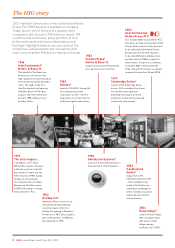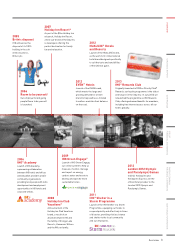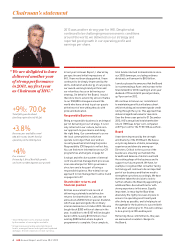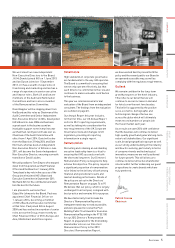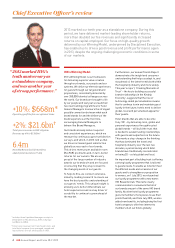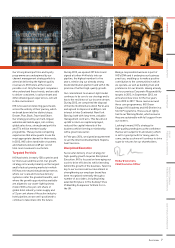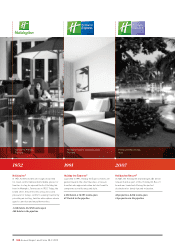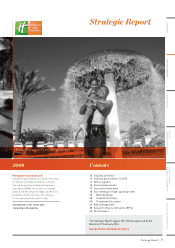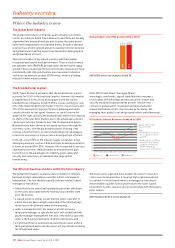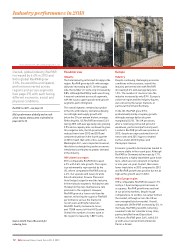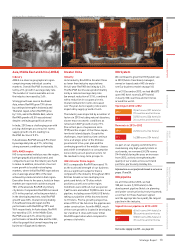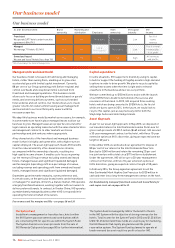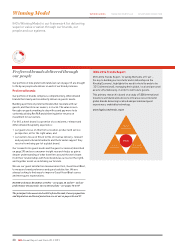Holiday Inn 2013 Annual Report Download - page 13
Download and view the complete annual report
Please find page 13 of the 2013 Holiday Inn annual report below. You can navigate through the pages in the report by either clicking on the pages listed below, or by using the keyword search tool below to find specific information within the annual report.
Where the industry is heading
Long-term drivers and global trends
In the long term, growth in the hotel industry is driven by a number
of trends:
Economic
The travel and hotel industries have benefited substantially from
long-term macroeconomic trends. Global GDP growth in the last
10 years of circa 4% per annum has contributed to increasing
disposable income and a greater number of middle-class
households, particularly in emerging markets such as Greater
China, with a greater propensity to travel.
Over the long term, global economic growth and more sophisticated
financialmarkets in emerging countries has led to a 1.8% increase
in global total hotel rooms supply over the last eight years.
Improvements in physical infrastructure, particularly in emerging
markets, have allowed hotels to more effectively meet the needs
of guests and to open up new destinations for travel.
Demographic
During the last 10 years the typical traveller demographic has
changed. Travellers travel for a variety of reasons and no longer
travel for a singular purpose, such as only business or leisure.
Across the globe, the type of traveller can range from single people
to multi-generation families. The younger workforce is driving
more diverse and informal working patterns, with an expectation
that hotels will cater for flexible working arrangements. A growing
ageing population with the desire, and means to travel, is expected
to significantly increase travel flows and lead to an overall increase
in demand for travel services.
Technology
Technology has played an important role in shaping the travel
industry. A decade ago, internet access and the role of digital
technology in planning, booking and experiencing travel was very
limited. Today, the reach and role of digital technology is very different.
The internet, increasingly accessed through mobile devices,
has established itself in developed markets as the preferred
method to research, plan and book travel. In emerging markets,
online purchasing and international travel are relatively new to
travellers, and therefore personal interactions remain key, making
the role of the traditional travel agent important. Industryexperts
estimate that about 12 to 15% of tickets and rooms are booked
online in China and of that online market, approximately 70 to 80%
are booked through third-party intermediaries.
Short–term drivers and global trends
Short-term industry trends are shaped by differing economic,
political or physical factors impacting local geographical markets.
Since the economic crisis of 2008/09, GDP growth has returned to
key economies, leading to an increase in disposable income and an
increase in demand for hotel rooms. Typically, the industry would
meet this demand through an increase in the supply of rooms.
The development of social networking and photo sharing has
changed the way in which people think about travel, with the sharing
of travel experiences, reviews and recommendations having a
greater impact on travel decision-making. These recommendations,
combined with the ability to compare prices and review the richer
information that is available online, allow travellers to make
informed decisions and book their travel options with greater
control and immediacy, leading to an increase in travel to a variety
of destinations.
IHG’s 2014 Trends Report (see page 20) found that the rapid rise
of technology-enabled personalisation is helping to shape the
experience guests want when they travel. It also found that
personalised brand experiences which resonate with the local
culture are particularly important for the fast-growing number
of international travellers from emerging markets.
Changing technological trends and changes in consumer behaviour
will continue to shape the industry.
Social
Other trends also present new opportunities to travel. Increased
competition and capacity amongst airlines, lower air fares and
more relaxed travel and immigration restrictions in many regions
have made international travel a viable option for an increasing
number of people.
Competitors
These long-term drivers and global trends are changing the
competitive landscape within the travel industry. Competitors are
no longer simply branded or independent hotels, but now include
travel intermediaries and companies offering alternative lodging
solutions and search options, providing inspiration for travel
ideas and aggregating a range of travel solutions. Many of these
businesses are also not subject to regulations such as fire and
life safety, food safety and local industry regulations, which apply
to traditional hotel operators.
In developed markets, recent industry revenue growth has
been driven largely by an increase in the room rate as occupancy
levels have returned to previous peak levels, but the growth
in supply of rooms has been below the long-term average.
In emerging markets, growth has been as a result of both an
increase in room rate and the supply of rooms. The industry is
also impacted in the short-term by local market economic or
political factors.
Source: Smith Travel Research for industryfacts.
Strategic Report 11
OVERVIEW STRATEGIC REPORT GOVERNANCE
GROUP
FINANCIAL STATEMENTS
PARENT COMPANY
FINANCIAL STATEMENTS ADDITIONAL INFORMATION



